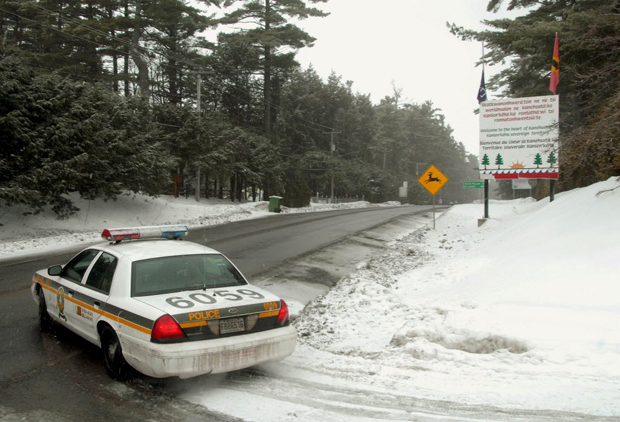First published in The Gazette on Jan. 26, 2010
MONTREAL – The Mohawks of Kanesatake called on the federal government Monday to return to the negotiating table to settle a long-standing land claim, a section of which is slated for development in the heart of Mohawk territory.
With a developer planning to build three luxury houses across the highway from "the Pines" – a tree-covered land adjacent to an aboriginal burial ground – the council wants talks to resume as soon as possible, Kanesatake Grand Chief Sohenrise Paul Nicholas said.
The area was at the centre of the 1990 crisis that erupted over a plan to expand the town of Oka’s golf course onto the Pines.
At a news conference yesterday, the band council demanded that developer Normand Ducharme refrain from cutting down trees on his property until the Mohawks’ land claims are settled.
"We don’t want a second Oka crisis – we want this matter resolved " Nicholas said, referred to the events during the 78-day armed standoff in 1990.
The band council said it wants Ottawa to buy the land from Ducharme and hold it in reserve until the claim is settled.
In 1977, the Mohawks filed a land claim over the old north shore Seigneury of Lake of Two Mountains. The 53,300-hectare claim also includes the towns of Oka, St. Benoît and Pointe Calumet.
Nicholas said he wants the federal government to invite Quebec to the negotiating table "so we can settle our differences once and for all."
Ottawa cut off negotiations unilaterally in 2006, the Mohawks say.
A spokesperson for the Indian and Northern Affairs Department said Ottawa doesn’t buy property to settle a specific claims and that the owner can’t be forced to sell it against his will.
The department is corresponding with the band council over the terms of future negotiations, Margot Geduld said.
"Canada is committed to keeping the lines of communication open in order to find a mutually agreeable solution," she added.
Ducharme said yesterday that he won’t return to the site this week to cut down a few pine trees that are in danger of falling on a neighbouring house. After saying last week that he would ask the Sûreté du Québec for help if Mohawks prevented him from cutting the trees, Ducharme changed his tone yesterday.
"We want things to calm down a little bit," he said. "We are worried about a confrontation."
Three of Ducharme’s employees left the property Jan. 18 after a handful of Mohawks showed up and told them they didn’t want any of the pine trees cut down.
The band council refused to speculate on what would happen if the trees on the disputed land were cut down, but Ellen Gabriel, who represents the traditionalist Longhouse in Kanesatake, said she believes the community will not allow that to happen.
"I am sure they will be stopped; people care about this land," she said.
The pine trees were planted between 90 and 120 years ago by Mohawks who were worried about soil erosion, Gabriel said.
"The danger in cutting down the tress is that there will be landslides," she said.
Gabriel, who was a Mohawk spokesperson during the Oka crisis 20 years ago, said the federal government "has broken a 20-year-old promise to work with Mohawks to find solutions to the longstanding land question at Kanesatake."
kwilton@thegazette.canwest.com








Comments